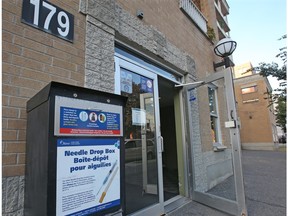Health
Ottawa Closes Clarence Street Supervised Consumption Service

The supervised consumption service located at 179 Clarence Street in Ottawa has been officially closed. The decision follows Ottawa Public Health’s (OPH) failure to secure the necessary endorsement from the province to continue the program. This closure affects a crucial resource for individuals who rely on supervised drug consumption services to mitigate overdose risks.
OPH previously operated the facility under a federal exemption that expired on September 30, 2023. To maintain operations, the service required a renewal from Health Canada, which, under Ontario’s new Community Care and Recovery Act, necessitated the endorsement of Sylvia Jones, Ontario’s Minister of Health. Such endorsement was not granted, resulting in the service’s discontinuation.
Impact of the Closure on Community Health Services
The Clarence Street site was one of three remaining supervised consumption facilities in Ottawa. Earlier in March 2023, the site at the Somerset West Community Health Centre was also ordered to close due to its proximity to schools and daycares. According to Dr. Trevor Arnason, Ottawa’s medical officer of health, the closure of the Clarence Street service raises significant concerns for residents who depend on these essential health services.
Dr. Arnason emphasized the vital role of harm reduction in health care, stating, “Harm reduction services save lives, reduce the spread of blood-borne infections, and provide safer spaces that help reduce public drug use.” He noted that the closure will adversely affect individuals who rely on these services, which have been critical in fostering trust and facilitating access to comprehensive health care resources, including housing and mental health support.
Since its inception in 2017, the Clarence Street supervised consumption service has recorded nearly 33,000 visits. In 2024 alone, the facility logged 3,546 visits, responded to 27 non-fatal overdoses, and facilitated over 2,000 referrals to essential wraparound services. Dr. Arnason pointed out that these statistics highlight the site’s significant impact in preventing cognitive impairment and deaths.
Remaining Services and Future Plans
Despite the closure of the Clarence Street site, other supervised consumption services, such as those at the Sandy Hill Community Health Centre and The Trailer 2.0 at the Shepherds of Good Hope, will remain operational. OPH has affirmed that harm reduction initiatives, including supply distribution, naloxone training, and sexually transmitted and blood-borne infections (STBBI) testing, will continue at the Clarence Street location.
The OPH’s mobile harm reduction van services, which operate daily from 17:00 to 23:30, will also remain unaffected by this closure. Dr. Arnason reassured that no employees will face layoffs as a result of the closure, noting that resources are being reallocated to ensure continued support for those in need.
Dr. Arnason reiterated OPH’s commitment to protecting the health and safety of all residents, stating, “We will continue engaging with individuals in need, building trust and facilitating access to services to achieve long-term well-being.” As the community grapples with the implications of this closure, the focus remains on sustaining essential health services for vulnerable populations in Ottawa.
-

 Politics4 weeks ago
Politics4 weeks agoSecwepemc First Nation Seeks Aboriginal Title Over Kamloops Area
-

 World5 months ago
World5 months agoScientists Unearth Ancient Antarctic Ice to Unlock Climate Secrets
-

 Entertainment5 months ago
Entertainment5 months agoTrump and McCormick to Announce $70 Billion Energy Investments
-

 Science5 months ago
Science5 months agoFour Astronauts Return to Earth After International Space Station Mission
-

 Lifestyle5 months ago
Lifestyle5 months agoTransLink Launches Food Truck Program to Boost Revenue in Vancouver
-

 Technology3 months ago
Technology3 months agoApple Notes Enhances Functionality with Markdown Support in macOS 26
-

 Lifestyle3 months ago
Lifestyle3 months agoManitoba’s Burger Champion Shines Again Amid Dining Innovations
-

 Top Stories2 months ago
Top Stories2 months agoUrgent Update: Fatal Crash on Highway 99 Claims Life of Pitt Meadows Man
-

 Politics4 months ago
Politics4 months agoUkrainian Tennis Star Elina Svitolina Faces Death Threats Online
-

 Sports5 months ago
Sports5 months agoSearch Underway for Missing Hunter Amid Hokkaido Bear Emergency
-

 Politics5 months ago
Politics5 months agoCarney Engages First Nations Leaders at Development Law Summit
-

 Technology5 months ago
Technology5 months agoFrosthaven Launches Early Access on July 31, 2025




















